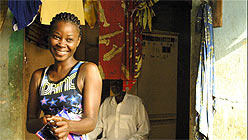One could be charitable, and attribute Americans’ general disinterest in movies from (or about) Africa to the vast physical distance between the continents. Except U.S. moviegoers rarely venture to see films from South America, either, which is in our hemisphere. It’s reflective of a bigger issue, I think, namely the cultural and political isolation that we’ve cultivated so assiduously, and which feels more entrenched than ever.
Now, with respect to African cinema — and to be uncharacteristically charitable, again — it’s entirely conceivable that its classic themes don’t speak to American audiences. The migration from rural villages to dog-eat-dog cities, family loyalty versus individual ambition, and the painful tug-of war between tradition and modernity were central concerns in the U.S. in the first half of the 20th Century but aren’t especially relevant today.
The touring African Film Festival, which decamped at the Pacific Film Archive for seven programs over three-plus weeks beginning last Saturday, January 22, illustrates that African filmmakers have progressed with the times. As an indication of just how far, the PFA includes three classics — Al Momia (1969), Touki Bouki (1973) and Trances (1981) — both for their own merits and as reference points.

“Beyond the Ocean”
My attention, however, was galvanized by the two newest features in the series. Eliane de LaTour’s vibrant Beyond the Ocean (2008) tracks the divergent paths of 20-something Ivory Coast friends with grandiose yet desperate dreams. As the film begins, lanky Otho and husky Shad are doing all right in Spain as entry-level hustlers. Ambitious young Africans used to head for the capitals of their countries, not so long ago, but nowadays real money can only be found “beyond the ocean.”



